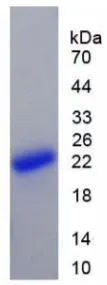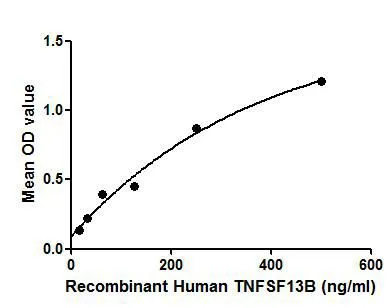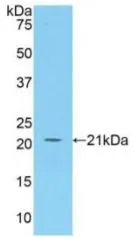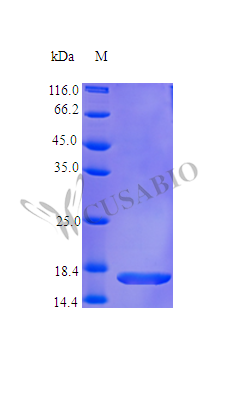
SDS-PAGE analysis of GTX00260-pro Human BAFF protein.
Human BAFF protein, His tag
GTX00260-PRO
ApplicationsFunctional Assay
Product group Proteins / Signaling Molecules
Protein IDQ9Y275
Overview
- SupplierGeneTex
- Product NameHuman BAFF protein, His tag
- Delivery Days Customer9
- Application Supplier NoteTumor necrosis factor ligand superfamily member 13B protein (TNFSF13B) also known as B-cell activating factor (BAFF) is a cytokine that belongs to the tumor necrosis factor (TNF) ligand family. This cytokine is a ligand for receptors TNFRSF13B/TACI, TNFRSF17/BCMA, and TNFRSF13C/BAFF-R. This cytokine is expressed in B cell lineage cells, and acts as a potent B cell activator. It has been also shown to play an important role in the proliferation and differentiation of B cells. Besides, Integrin Beta 1 (ITGb1) has been identified as an interactor of TNFSF13B, thus a binding ELISA assay was conducted to detect the interaction of recombinant human TNFSF13B and recombinant human ITGb1. Briefly, TNFSF13B were diluted serially in PBS, with 0.01% BSA (pH 7.4). Duplicate samples of 100 microl were then transferred to ITGb1-coated microtiter wells and incubated for 2h at 37C. Wells were washed with PBST and incubated for 1h with anti-TNFSF13B pAb, then aspirated and washed 3 times. After incubation with HRP labelled secondary antibody, wells were aspirated and washed 3 times. With the addition of substrate solution, wells were incubated 15-25 minutes at 37C. Finally, add 50 microl stop solution to the wells and read at 450nm immediately. The binding activity of TNFSF13B and ITGb1 was in a dose dependent manner.
- ApplicationsFunctional Assay
- CertificationResearch Use Only
- ConjugateUnconjugated
- Gene ID10673
- Target nameTNFSF13B
- Target descriptionTNF superfamily member 13b
- Target synonymsBAFF, BLYS, CD257, DTL, TALL-1, TALL1, THANK, TNFSF20, TNLG7A, ZTNF4, tumor necrosis factor ligand superfamily member 13B, ApoL related ligand TALL-1, B-cell-activating factor, B-lymphocyte stimulator, Delta4 BAFF, TNF and ApoL-related leukocyte expressed ligand 1, TNF homolog that activates apoptosis, delta BAFF, dendritic cell-derived TNF-like molecule, epididymis secretory sperm binding protein, tumor necrosis factor (ligand) superfamily, member 13b, tumor necrosis factor (ligand) superfamily, member 20, tumor necrosis factor ligand 7A, tumor necrosis factor superfamily member 13b, tumor necrosis factor-like protein ZTNF4
- Protein IDQ9Y275
- Protein NameTumor necrosis factor ligand superfamily member 13B
- Scientific DescriptionThe protein encoded by this gene is a cytokine that belongs to the tumor necrosis factor (TNF) ligand family. This cytokine is a ligand for receptors TNFRSF13B/TACI, TNFRSF17/BCMA, and TNFRSF13C/BAFFR. This cytokine is expressed in B cell lineage cells, and acts as a potent B cell activator. It has been also shown to play an important role in the proliferation and differentiation of B cells. Alternatively spliced transcript variants encoding distinct isoforms have been identified. [provided by RefSeq, Mar 2011]
- Storage Instruction-20°C or -80°C,2°C to 8°C
- UNSPSC41116120
- SpeciesHuman





